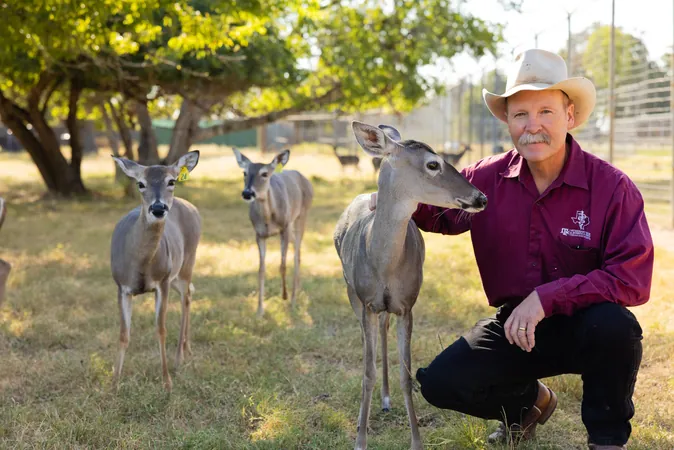
Breakthrough in Oral Anthrax Vaccine Development for White-Tailed Deer: A Game Changer for Wildlife Health!
2024-11-05
Author: Li
Introduction
In an exciting advancement in wildlife health, researchers at the Texas A&M College of Veterinary Medicine and Biomedical Sciences have made significant strides toward developing an oral vaccine for anthrax. Their promising study has received attention for demonstrating a successful immune response in white-tailed deer, a key focus in combating this dangerous disease.
Publication and Importance
Published in the Journal of Zoo and Wildlife Medicine, this landmark research highlights the necessity of an oral vaccine in managing anthrax infections in wild populations. Traditional vaccination methods, requiring the capture and injection of individual animals, are unfeasible in the wild. Dr. Walt Cook, a clinical professor in the veterinary pathology department, underlined the challenges faced by ranchers in anthrax-prone regions, where vaccination of herds is standard practice but remains impossible for wildlife.
Role of White-Tailed Deer
White-tailed deer play a crucial role in anthrax outbreaks—when an infected deer dies, its decomposing body releases spores into the environment, which can remain viable in the soil for decades. "These spores can infect other animals when they breathe in contaminated soil, consume infected vegetation, or drink tainted water," Dr. Cook elaborates. This makes effective control of anthrax in deer populations not only important but necessary to prevent widespread outbreaks.
Research Goals and Location
The research team aims to develop an oral vaccine that can be delivered through bait in high-risk areas like the Edwards Plateau in Central Texas, which witnessed a staggering spike in anthrax-related deaths in 2019, possibly affecting up to 10,000 animals in just a few months.
Innovative Techniques Utilized
Dr. Jamie Benn Felix, an assistant professor, has spearheaded efforts to adapt the vaccine from a traditional injection to an oral format. One of the key challenges is ensuring that anthrax spores survive long enough in the gastrointestinal tract to elicit an immune response. Utilizing microencapsulation—a technique developed by Dr. Allison Rice-Ficht, which protects brucellosis vaccines from stomach acid—Benn Felix created a new formula capable of achieving this goal.
Successful Testing
"Thanks to the collective efforts of our team, the new oral vaccine was successfully tested, generating an immune response. This confirms that our encapsulation method is effective!" Dr. Cook stated.
Next Steps and Future Outlook
Looking ahead, researchers are now focused on determining the best method to distribute the oral vaccine to wild deer via food baits, a significant next step towards safeguarding wildlife health against anthrax.
Conclusion
This remarkable breakthrough represents hope not just for deer populations, but for wildlife conservation efforts across the globe. As we strive to protect these vital species, the development of tailored vaccines could potentially save countless lives and prevent future outbreaks of this lethal bacteria. Stay tuned as this story develops—could this be the key to eradicating anthrax in wildlife for good?

 Brasil (PT)
Brasil (PT)
 Canada (EN)
Canada (EN)
 Chile (ES)
Chile (ES)
 España (ES)
España (ES)
 France (FR)
France (FR)
 Hong Kong (EN)
Hong Kong (EN)
 Italia (IT)
Italia (IT)
 日本 (JA)
日本 (JA)
 Magyarország (HU)
Magyarország (HU)
 Norge (NO)
Norge (NO)
 Polska (PL)
Polska (PL)
 Schweiz (DE)
Schweiz (DE)
 Singapore (EN)
Singapore (EN)
 Sverige (SV)
Sverige (SV)
 Suomi (FI)
Suomi (FI)
 Türkiye (TR)
Türkiye (TR)